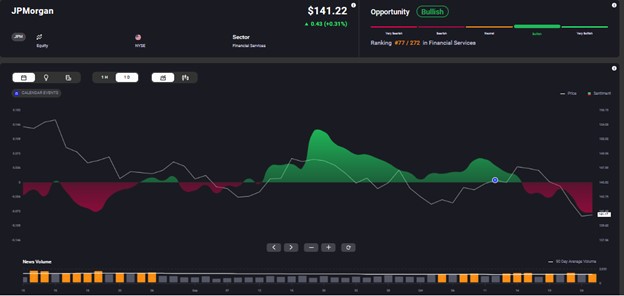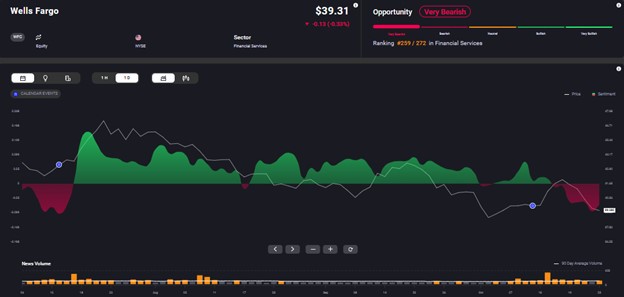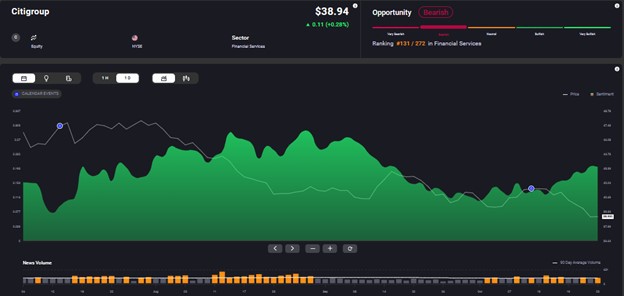JPMorgan Chase: The Joy of Interest Income
The world’s largest bank by market cap, JPMorgan is considered a bellwether not just for the US financial market but for the global investment banking sector. And this was reflected in its third-quarter performance. JPMorgan navigated the challenging backdrop with the strength and conviction of a leader, despite the $31 billion decline in deposits.
- Revenues climbed 22% to $39.87 billion, slightly ahead of market expectations of $39.63 billion.
- Profits jumped a whopping 35% to $13.2 billion.
- Earnings came in at $4.33 per share, handsomely beating the consensus estimates of $3.96 per share.
JPMorgan’s revenue growth was driven by higher interest rates, which allowed the bank to charge customers much more on loans than it did last year. Management also cited good credit quality as a driver of the performance.
Management raised their full-year guidance for net interest income for the fourth time this year, from $87 billion to $88.5 billion. CEO Jamie Dimon admitted that the earnings beat was driven by ‘over-earning’ on net interest income and below normal credit costs, both of which should normalise by the end of this year.
When asked about the Fed’s rate hike plans ahead, Dimon said, “I don’t think it makes a piece of difference whether the rates go up 25 basis points or more, like zero, none, nada.” JPMorgan does have the resources in place to defend itself even if the global economic scenario worsens. This is reflected in the bullish sentiment for JPMorgan on Acuity’s AssetIQ widget.

Wells Fargo: Higher Interest Rates Offset Slowing Lending Activity
Wells Fargo, which serves more than 70 million customers, reported a stellar performance for the third quarter.
- Revenues grew by 6.5% to $20.86 billion, beating the consensus estimates of $20.09 billion.
- The 8% growth in net interest income drove the bank’s net income to $5.77 billion, versus $3.59 billion in the year-ago quarter.
- Earnings came in at $1.48 per share, significantly higher than market expectations of $1.39 per share.
With slowing lending activity, the bank reported a decline of $7.1 billion in deposits, to $1.34 trillion in the quarter. CEO Charlie Scharf said Wells Fargo was witnessing the “impact of the slowing economy with loan balances declining and charge-offs continuing to deteriorate modestly.”
Management said Wells Fargo’s provision for credit losses in the quarter included an increase of $333 million for credit losses for commercial real estate office loans and higher credit card loan balances. The bank guided to net interest income of $45 billion for the full year, representing 10% year-over-year growth.
Wells Fargo’s stock has lost around 6% year to date, while rival JPMorgan has made around the same percentage in gains. In fact, Wells Fargo’s stock has been undervalued for some time, having lost around 14% over the past year and is not an investor favourite, despite the bank’s ability to withstand a murkier macro environment.

Citigroup: Things Aren’t Looking Up Since Jane Fraser Took Over as CEO
Citigroup has been the worst performer among the top US banks this year. Despite higher-than-expected earnings and the best quarter in around a decade, its shares closed 0.2% lower on the day of the release. Citi recorded a decline of $46.4 billion in deposits in the third quarter.
- Revenues grew by 9% to $20.14 billion, exceeding the consensus estimate of $19.27 billion.
- Net income rose by 2% to $3.5 billion.
- Earnings came in at $1.63 per share, surpassing Wall Street expectations of $1.23 per share.
The bank’s performance has been deteriorating since CEO Jane Fraser took over. The stock has lost roughly 40% since Fraser become CEO in 2021, during which time other US big banks have expanded their market cap. In fact, Citi is the second-worst performing stock (behind Monster) in the S&P 500 index in the past two decades.
Fraser announced a restructuring initiative last month, focused on improving Citi’s profitability. The restructuring involves simplifying the bank’s structure, which involves eliminating several layers of middle management. Citi has already announced some high-profile departures as part of the initiative.
Citigroup has enough loss reserves to manage an economic slowdown and even a recession. Also, the bank has divested large noncore businesses, which should reduce capital requirements. Despite this, continued investor caution has sent the stock to extremely depressed levels.


